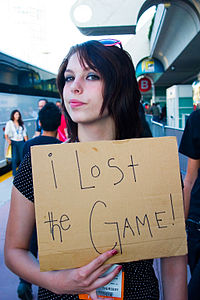The Game (mind game): Difference between revisions
No edit summary |
|||
| Line 15: | Line 15: | ||
footnotes = Theoretically, The Game is always in progress and everybody in the world is a player.}} |
footnotes = Theoretically, The Game is always in progress and everybody in the world is a player.}} |
||
'''The Game''' is an ongoing [[mind game]], the objective of which is to avoid thinking about The Game itself. Thinking about The Game constitutes a loss, which, according to the rules of The Game, must then be announced. How to win The Game is not defined in the rules; players can only attempt to avoid losing for as long as possible. The Game has been described alternately as pointless and infuriating, or as a challenging game that is fun to play.<ref name="canpress"/> As of 2008, The Game is played by millions worldwide.<ref name="metro">{{cite news|url=http://www.metro.co.uk/news/article.html?If_you_read_this_youve_lost_The_Game&in_article_id=430703&in_page_id=34|title=If you read this you have lost the game|work=The Metro|date=2008-12-05}}</ref><ref name="canpress" /><ref name="nebraskan">{{cite news|url=http://media.www.dailynebraskan.com/media/storage/paper857/news/2007/03/19/ArtsEntertainment/Mind-Game.Enlivens.Students.Across.U.s-2779474.shtml|title=Mind game enlivens students across U.S.|work=The Daily Nebraskan|first=Andy|last=Boyle|date=2007-03-19}}</ref><ref name="demorgen" /><ref name="depers" /> |
'''The Game''' is an ongoing [[mind game]], the objective of which is to avoid thinking about The Game itself. Thinking about The Game constitutes a loss, which, according to the rules of The Game, must then be announced.(As in right now, you just lost the game) How to win The Game is not defined in the rules; players can only attempt to avoid losing for as long as possible. The Game has been described alternately as pointless and infuriating, or as a challenging game that is fun to play.<ref name="canpress"/> As of 2008, The Game is played by millions worldwide.<ref name="metro">{{cite news|url=http://www.metro.co.uk/news/article.html?If_you_read_this_youve_lost_The_Game&in_article_id=430703&in_page_id=34|title=If you read this you have lost the game|work=The Metro|date=2008-12-05}}</ref><ref name="canpress" /><ref name="nebraskan">{{cite news|url=http://media.www.dailynebraskan.com/media/storage/paper857/news/2007/03/19/ArtsEntertainment/Mind-Game.Enlivens.Students.Across.U.s-2779474.shtml|title=Mind game enlivens students across U.S.|work=The Daily Nebraskan|first=Andy|last=Boyle|date=2007-03-19}}</ref><ref name="demorgen" /><ref name="depers" /> |
||
== Gameplay == |
== Gameplay == |
||
Revision as of 15:56, 28 April 2009
 A player announcing her loss of The Game | |
| Setup time | None |
|---|---|
| Playing time | Ongoing |
| Chance | Chance encounters with others losing The Game could cause your own loss |
| Skills | Thought suppression, Strategy |
| Theoretically, The Game is always in progress and everybody in the world is a player. | |
The Game is an ongoing mind game, the objective of which is to avoid thinking about The Game itself. Thinking about The Game constitutes a loss, which, according to the rules of The Game, must then be announced.(As in right now, you just lost the game) How to win The Game is not defined in the rules; players can only attempt to avoid losing for as long as possible. The Game has been described alternately as pointless and infuriating, or as a challenging game that is fun to play.[1] As of 2008, The Game is played by millions worldwide.[2][1][3][4][5]
Gameplay
Rules
There are three rules to The Game:[2][1][6][7][8]
- Everyone in the world is playing The Game. (Sometimes narrowed to: "Everybody in the world who knows about The Game is playing The Game,"[4] or alternatively, "You are always playing The Game.")
- Whenever one thinks about The Game, one loses.
- Losses must be announced to at least one person[6] (a statement such as "I lost The Game" is often used[citation needed]).
Some players allow a grace period of up to half an hour after someone has lost, during which a player cannot lose The Game again, or is not obliged to announce a loss.[1] According to the common rules, The Game is never ending. However, one variation of The Game ends when the British Prime Minister announces "The Game is up" on television.[6]
Strategies
Some players have developed strategies for making other people lose, such as writing about The Game on hidden notes, as graffiti, and on banknotes.[4][5]
Origin
The origins of The Game are uncertain. One theory is that when two men missed their last train and had to spend the whole night on a platform, they tried not to think about their situation and whoever did first, lost.[2] Another is that it was invented in London in 1996 "to annoy people". The reported earliest known reference on the Internet is from 2002.[1] The Game is an example of ironic processing, also known as the Pink Elephant Phenomenon, in which attempts to avoid certain thoughts make those thoughts more persistent.[9] A classic example of ironic processing is Dostoevsky's quote: “Try to pose for yourself this task: not to think of a polar bear, and you will see that the cursed thing will come to mind every minute.”
See also
Cultural phenomena:
Other unconventional games:
References
- ^ a b c d e Montgomery, Shannon (2008-01-17). "Teens around the world are playing 'the game'". The Canadian Press.
- ^ a b c "If you read this you have lost the game". The Metro. 2008-12-05.
- ^ Boyle, Andy (2007-03-19). "Mind game enlivens students across U.S." The Daily Nebraskan.
- ^ a b c Verelst, Jeroen (2007-03-15). "The Game, het eenvoudigste spel ter wereld" (Subscription required). De Morgen (in Dutch). p. 2.
- ^ a b Rooseboom, Sanne (2008-12-15). "Nederland gaat nu ook verliezen". De Pers.
- ^ a b c "The three rules of the game". The Metro. 2008-12-05.
- ^ "Don't think about the game" (Subscription required). Rutland Herald. 2007-10-03.
- ^ Wettschreck, Justine (2008-05-31). "Playing 'The Game' with the other kids" (Subscription required). Daily Globe (Worthington).
- ^ Kaniewski, Katie (1 March 2009). "You just lost the Game". Los Angeles Loyolan. Retrieved 2009-03-27.
